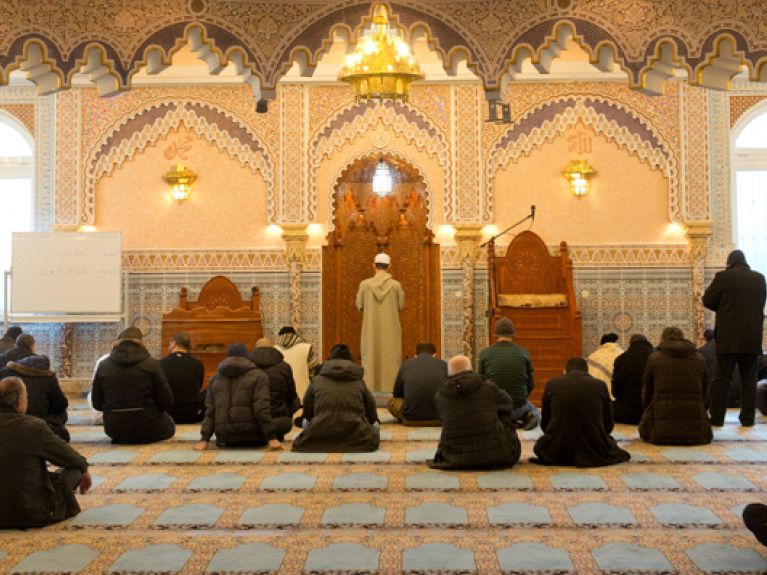Innovative ideas for combating radicalisation
European partners are jointly developing ideas to prevent radicalisation and terrorism.

Terrorism, radicalism, extremism – these are words that just a few years ago were generally used in Germany in connection with radical right- or left-wing organisations. Now the terms are also associated with radical Islamism.
The attacks on the French satirical magazine Charlie Hebdo and a Copenhagen synagogue in early 2015 have demonstrated once again how urgently viable strategies are needed to prevent radicalisation – in individual EU countries and across their borders. The fact is, radical Islamism has become a global phenomenon. It is rapidly mushrooming, appealing to more and more young people and using all the available resources of an interconnected world. According to the Federal Office for the Protection of the Constitution, in Germany alone some 6,300 people are part of the radical Islamic Salafist scene. They are attracted, among other things, by online propaganda specifically designed to appeal to young people – by aestheticising violence, promising social cohesion and heroising fighters. Of the approximately 600 fighters who have so far left Germany and travelled to Syria or Iraq to support the terrorist organisation Islamic State, around 200 have since returned home. The authorities also suspect that a large number have left the country undetected. In early February 2015, the Federal Government responded by passing new legislation designed to prevent attacks by radical Islamists. Under this new law, anyone leaving Germany to join a terrorist training camp will in future be liable to prosecution. Also planned are effective sociopolitical measures to tackle the roots of the problem – by homing in on the breeding grounds for radicalism.
It’s a policy also supported by representatives of cities and municipalities. “It’s imperative that we develop strategies for the early detection and prevention of radicalisation,” says Tanja Schwarzer, head of the City of Dusseldorf’s Crime Prevention Council. The council comprises representatives of the police, public authorities and schools, but also civil society organisations, all of which are pooling their experience, ideas and resources to combat violent crime. The ideas discussed there on how to fight violent crime and criminality will in future also be incorporated into the EU-funded project LIAISE (Local Institutions Against Extremism), of which Dusseldorf became a partner in October 2014. LIAISE was launched by the European Forum for Urban Security (EFUS). The idea is for regional representatives and experts to use the project as a cross-border platform to facilitate exchange Europe-wide. At the end of the two-year project phase, they plan to co-author a guide designed to serve public authorities as a manual for the early detection and combating of radicalisation. One objective was determined as a key priority by the partners at their first meeting in Paris in 2014, says Schwarzer: “A major goal of the participating cities, which include Dusseldorf, Brussels and Malmö, is – besides developing strategies for the early detection of radicalisation – to find ways of offering alternatives to the young people at risk.”
It’s obvious just how urgent this matter is: according to studies by the Federal Office for the Protection of the Constitution, many of the violent Islamists come from disadvantaged backgrounds where they seldom experience respect or success – or support in dealing with difficult life situations. Tackling this problem is also the aim of the federal programme Demokratie leben! (Living Democracy), which was launched in 2015. Under this programme, the Federal Ministry of Family Affairs is investing 40.5 million euros – more money than ever before – in regional networks, counselling services, model projects and expert conferences that focus on preventing extremism. The projects being supported include working with the parents of the young people affected and providing coaching for young perpetrators of politically or religiously motivated violence.
The City of Dusseldorf could offer good models for some of the planned initiatives. Several innovative strategies have already proved successful there – for example, the further training programme Imame zu Demokratiebotschaftern (Making Imams Ambassadors of Democracy). The project was developed by North Rhine-Westphalia‘s State Agency for Civic Education, Dusseldorf Police Headquarters and the Deutsch-Islamische-Moschee-Stiftung-Düsseldorf (German-Islamic Mosque Foundation Dusseldorf) after a number of imams suggested cooperating with the Dusseldorf police. Officers are now training Muslim religious scholars to serve as contact persons who are able to mediate democratic values in a sound and objective manner. “Unlike the police and many other institutions, interested and engaged imams are present in places where this sort of prevention work is possible,” says Carmen Teixeira of North Rhine-Westphalia‘s State Agency for Civic Education. The work has already paid off, she believes, but the imams still need support – not only from their own communities but from the society they live in.

